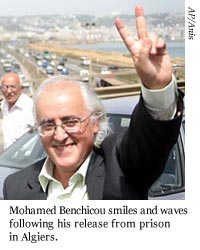New York, June 14, 2006—The Committee to Protect Journalists welcomes the release today of Mohamed Benchicou, publisher of a newspaper critical of the Algerian government, who was jailed two years ago for allegedly violating currency regulations.
“We are relieved that our colleague Mohamed Benchicou is once again a free man, but his release doesn’t alter the fact that he spent two years in prison on spurious charges,” said CPJ Executive Director Ann Cooper.
Benchicou’s daily, Le Matin, was forced to close in 2004 when the state printer demanded the newspaper settle its outstanding debts immediately. Benchicou was freed from El-Harrache prison outside the capital Algiers. He was jailed for allegedly failing to declare currency he brought into the country after a trip to France. The charges were viewed by journalists and human rights groups as retaliation for Le Matin’s critical editorial line against the government.
The prosecution was brought shortly after Le Matin alleged that Interior Minister Yazid Zerhouni had tortured detainees while he was a military security commander in the 1970s. Benchicou, a frequent government critic, further angered officials in February 2004, when he published a book about President Abdelaziz Bouteflika titled Bouteflika, An Algerian Fraud.
Several criminal defamation lawsuits are also pending against Benchicou for articles published in Le Matin. He faces possible jail time if convicted in these cases or if past convictions are upheld on appeal.
Over the years, Algerian authorities have used tough criminal laws that prescribe prison terms in order to prosecute several leading journalists who are critical of the government, according to CPJ research.
In 2001, the government toughened these laws when the Algerian Parliament approved a series of new amendments to the penal code that prescribe prison terms of up to one year and fines up to 250,000 dinars (US$3,200) for defaming the president. A separate amendment imposes similar punishments for defaming Parliament, the courts, the military, or other state institutions. Writers, publishers, and responsible editors are held accountable for offending articles, along with publications themselves, which can be fined up to 2.5 million dinars (US$32,000).
“Through its use of these draconian laws Algeria continues to undermine basic press freedoms,” Cooper said. “We call on the authorities to dismiss all pending criminal charges against Mohamed Benchicou and other journalists, and to reform Algerian law in accordance with international standards.”
